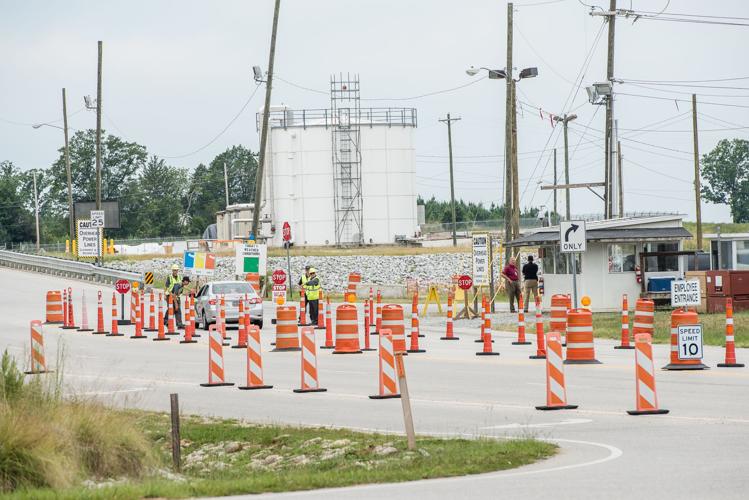To hear SCANA Corp. tell it, South Carolina's electric grid is sitting on a financial powder keg, and regulators are playing with matches.
Make one wrong move and the Cayce-based owner of South Carolina Electric & Gas warns that its financial stability could go up in flames.
And when the smoke clears, the company argues, it might not be able to keep the lights on.
The spark that SCANA wants to snuff out is a proposal to slash South Carolinians' power rates after the company walked away from a pair of unfinished nuclear reactors near Columbia. SCE&G customers are paying 18 percent of their electric bills each month for the two units, which might never produce a kilowatt of power. If that revenue stops coming in, the company has warned that it could be forced to file for bankruptcy protection to restructure its finances.
The gloomy picture painted by SCANA was meant to give regulators pause as they decide who should pay for the costly V.C. Summer project in the years ahead. But financial analysts and industry observers — including a consultant the company hired — say the path to insolvency isn't as simple as an abrupt reduction in revenue.
Instead, it comes down to the nuance of accounting rules and the terms of the company's loans.
Bankruptcy isn't out of the question, they say, but it may not be the inevitable outcome the company has suggested. It might take more than a rate cut to set off the "cascade" of bad news that SCANA has said would leave it so short of cash it won't be able to maintain its grid.
Liquidity concerns
The risk to SCANA's finances is bigger than the $37 million its customers are paying each month toward the abandoned nuclear units.
The company has plenty of cash flow, which "suggests that they'd have the capability of absorbing" a rate rollback, said Christopher Muir, an analyst at the research firm CFRA. It could slash its dividend payments to stockholders or reduce its profits and still make ends meet.
But there's a bigger underlying risk that involves the money SCANA is getting from customers and the unfinished project. In accounting terms, the two unfinished units have value because the company is making money on them, even if they aren't functioning.
As long as the company is bringing in that $37 million each month, the reactors count as corporate assets, and the billions of dollars they cost can stay on the company's books.
The idea works in reverse, too: If customers stop paying into the project, the reactors will become worthless on paper, according to Jimmy Addison, SCANA's finance chief and incoming CEO. And when the units are erased from the books, the company will suddenly be worth billions of dollars less. The company's proposal to formally abandon the units on paper and claim a $2 billion tax credit would not have the same devastating financial consequences.
So why does it matter what SCANA is worth on paper? It all comes down to the company's lenders. An abrupt reduction in assets — the total of all SCANA's money, land and equipment — could throw a wrench into the loans it has already taken out.
When everything's going to plan, long- and short-term loans account for about half of the funds that electric utilities have access to. The rest is known as equity, and it’s a hypothetical value. It’s what is left over after a company sells everything it owns and pays all of it bills.
Those numbers — debt and equity — should be about the same, and that's about where SCANA is today. But the company says erasing the nuclear plant from its books would throw that ratio out of whack. The company would basically be admitting that if it had to sell everything tomorrow, the unfinished reactors would be worthless.
That ratio is important to the terms of its credit lines, also known as "revolvers," which are the equivalent of a Visa or American Express card. If debt ever makes up more than 70 percent of the company's financing, SCANA's lenders could cut it off. The company's ability to borrow money in a pinch would lock up.
That would make it harder to pay for the day-to-day business of running a power company — to make payroll or buy fuel for plants. Borrowing money would also get more expensive.
"Liquidity becomes an issue when a company no longer has access to a revolver," said Maude Tremblay, a utility analyst at Fitch Ratings, which has threatened to downgrade SCANA's long-term debt if the rate rollback is approved. "So, liquidity is a concern should the asset have to be written off. Liquidity is usually what gets companies into financial trouble."

Work on two reactors at the V.C. Summer Nuclear Power Station came to a halt July 31. File/Grace Beahm/Staff
Unclear result
So would a rate rollback push SCANA into bankruptcy? That's uncertain, because it's not clear that a mandated rate cut alone would push the company over the crucial 70 percent line.
Even Ellen Lapson, a utility consultant SCANA hired to help make its case, said a rollback wouldn't move the debt-to-equity ratio above that threshold.
In written testimony, Lapson suggested that regulators would have to go further to cross that mark, such locking up some of the company's money or forcing it to refund customers immediately. SCANA declined to comment beyond Lapson's testimony.
Lapson's take differs from the gloom-and-doom scenario that SCANA attorney Belton Zeigler of the law firm Womble Bond Dickinson laid out last week. He told regulators that any action they took would spook investors. And if they go too far, he said, they could leave the company unable to pay for its daily needs and too fragile to mount an effective recovery effort if disaster struck.
SCANA has pointed to the months-long power outages still ravaging Puerto Rico long after Hurricane Maria ripped across the Caribbean. The island gets its electricity from a bankrupt public-sector power provider, and repair crews have been reluctant to work for a financially unstable utility.
"What the company would say to its customers is, 'Believe us when we say there's a limit to what we can do here — that if we exceed that limit it’s going to hurt you more than you can imagine,'" Zeigler said Tuesday, at the end of an eight-hour public hearing in Columbia. "If you don't believe that message and go down the road that we're going down here, I'm absolutely convinced you will see that the company wasn't kidding."
To be sure, a rate reduction could cause trouble even before bankruptcy. It would almost certainly cause credit-rating agencies to warn bond investors that lending SCANA money is getting riskier, and that would make it more expensive to for the utility owner to borrow. It would likely also dent the company's already-battered stock price, making it harder to raise funds by selling shares.
Lapson says that would cause its own problems, though they wouldn’t be as extreme as long-term blackouts. Instead, she predicted fewer investments in infrastructure and "lower levels of reliability and customer service."

Public Service Commission chairman Swain Whitfield (left,) confers with a staff attorney. Whitfield expressed concerns about what would happen if SCANA Corp. goes bankrupt. John A. Carlos II/Special to The Post and Courier
'Extremely pragmatic'
That's not what regulators on the Public Service Commission appeared to take away from last week's hearing. Swain Whitfield, the chairman, said he feared a catastrophic storm striking South Carolina while the utility is weak.
"I have this image, if you will, of there being a hurricane and SCE&G trucks driving up to the gas pump and his fuel card not working," Whitfield said Wednesday.
Sentiments like that led analysts like Neil Kalton of Wells Fargo to think that regulators won't make any drastic changes to the rate structure. Despite the "heated political rhetoric," Kalton said in a research note, he expects regulators' approach to be "extremely pragmatic."
But if regulators decide not to cut SCE&G's rates, lawmakers suggested they were willing to call the company's bluff. Among the changes the Legislature will consider is a proposal to cut off money for the scuttled nuclear project.
House Speaker Jay Lucas says he will push a rate cut when lawmakers return to Columbia next month. And state Rep. Peter McCoy, a Charleston Republican who led the House panel that drafted the proposal, says he is "just not going to be bullied into believing" that bankruptcy is the only option.
"They have options," McCoy said. "Period."











